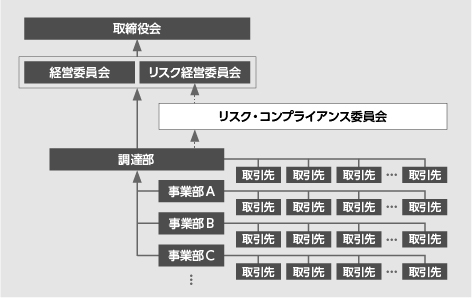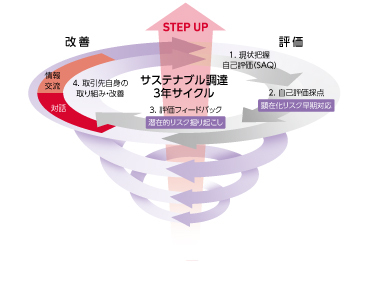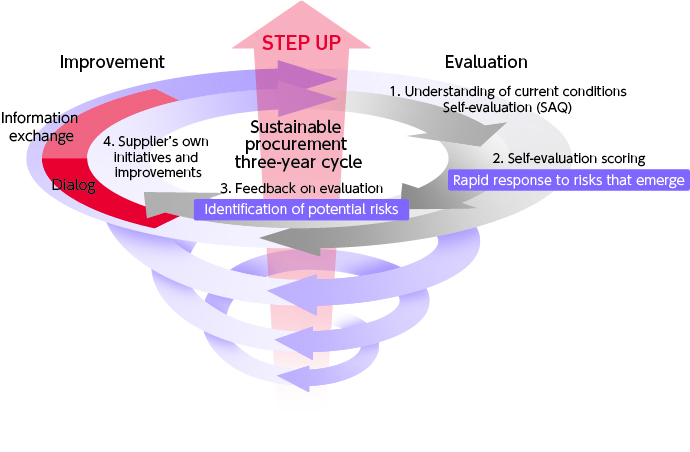Sustainable procurement
Basic approach
We conduct fair and equitable procurement activities in order to operate with integrity toward all stakeholders.
We have established a basic procurement policy and our own sustainable procurement guidelines, with the aim of contributing to the realization of a sustainable society throughout the entire supply chain.
Policy
Sustainable procurement guidelines
The environment surrounding companies is becoming more diverse, and in order to achieve sustainable development, it is expected that each company will actively work to fulfill its social responsibility not only through one company, but throughout the entire supply chain. Based on Management Philosophy and Action Mindset, our group has established a basic procurement policy, and through procurement activities based on Integrity ethical standards, we will co-create a "society where sustainable development is possible" with our business partners throughout the supply chain. In order to fulfill this responsibility, we have formulated our own sustainable procurement guidelines based on the international standards ISO26000 (guidance on social responsibility), ISO28001 (supply chain management system), and ISO20400 (guidance on sustainable procurement), as well as the SDGs (Sustainable Development Goals) and the 10 principles of the United Nations Global Compact, from the perspectives of ① organizational governance, ② human rights, ③ labor practices, ④ the environment, ⑤ fair business practices, ⑥ consumer issues, and ⑦ social contribution. We exchange information with our business partners about the status of our sustainability efforts and strive to mutually improve our level.
Governance
In promoting sustainable procurement, the Procurement Department plays a central role and works closely with business partners in accordance with the Sustainable Procurement Guidelines.
Any risks that become apparent are reported to Risk Management and Compliance Committee and Board of Directors, and appropriate measures are taken under an appropriate supervisory system.

Strategy
To steadily advance procurement transformation activities and accelerate their pace, we established Procurement Headquarters in April 2024 and established a system for company-wide activities by assigning executives from all departments to concurrent positions. In July of the same year, we appointed a CPO, strengthening the promotion system and advancing our efforts.
Risk management
dialogue with business partners
We believe that true "dialogue" based on trust with business partners is important in building a healthy supply chain through sustainable procurement activities.
Our dialogue with business partners follows the steps outlined in the diagram below (diagram of dialogue cycle with business partners). In the first half (steps 1 and 2), we ask each business partner to carry out a self-assessment based on a self-assessment form, which leads to the early detection and response of actualized risks. After that, if necessary, we move on to direct dialogue with a view to uncovering potential risks (steps 3 and 4).
In these dialogue, issues identified from the perspective of sustainable procurement are discussed beyond the positions of ordering and receiving parties, and actions for improvement are confirmed by both parties.
●Image of dialogue cycle with business partners

●The cycle of dialog with suppliers

|
|
|
|
|
Plan |
|---|---|---|---|---|
|
Cumulative number of business partners (single year) |
(113 companies) |
(91 companies) |
(29 companies) |
(39 companies) |
|
Cumulative number of business partners implemented (single fiscal year) |
|
|
(29 companies) |
|
Selection of new business partners based on social and environmental standards
As part of our procurement activities, we communicate at in-house study sessions that we will fulfill our social responsibilities throughout the supply chain through collaboration with our business partners. Furthermore, when selecting new business partners, we follow the Sustainable Procurement Guidelines.
Initiatives
Building a supply chain management system
Our company has a social mission of ensuring a stable supply of energy and materials, and we have a responsibility to work to strengthen our supply chain. We will expand our sustainable procurement efforts, visualize our supply chain to understand risks, reduce procurement risks, and establish and establish a supply chain management system.